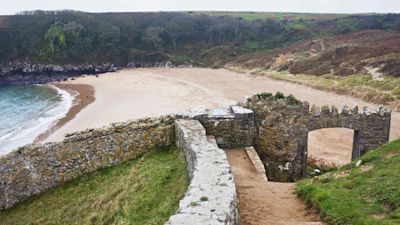Public urged not to swim after sewage released at Pembrokeshire and Anglesey beaches

Public health warnings are in place at four Welsh beaches with people being advised not to swim after sewage was released into the water.
The guidance has been issued by the Safer Seas and Rivers Service following the latest heavy rainfall to hit the UK.
An alert has been issued at Barafundle Bay in Pembrokeshire after sewage was discharged from a nearby sewer within the last forty-eight hours.
Warnings have also been put in place at Wiseman's Bridge and Saundersfoot beach, also in Pembrokeshire, while a fourth warning is in place at Benllech beach in Anglesey.
A spokesperson for Pembrokeshire Council said: "We are advising the public of a suspected sewage pollution incident at Wiseman’s Bridge. The discharge could potentially affect bathing water quality. There is an increased risk of infection. Further investigations are taking place. The beach remains open."
Conservative MS for Carmarthen West and South Pembrokeshire, Samuel Kurtz, called for the Welsh Government and Natural Resources Wales to take action.
Mr Kurtz said: “This is an incredibly concerning situation – we cannot have sewage pollution in our waterways".
In response to the incident a spokesperson from Natural Resources Wales said: “Keeping rivers and bathing waters clean and safe for people and wildlife is an important part of the work that we do.
“We’re investigating a pollution incident at a permitted private sewage treatment discharge point in Wiseman’s Bridge. The issue is currently being resolved and Pembrokeshire County Council has put up signs at Wiseman’s Bridge beach to warn the public that the bathing water quality may be affected".
Safer Seas & Rivers Service monitors water quality at more than 400 locations coastal and river areas across the UK.
Last week more than 50 beaches across the UK had sewage warnings in place following the heavy rain. That included Rest Bay and Sandy Bay, with both since receiving the all clear.
Talking about the role of combined storm overflows (CSOs) - valves which release sewage in heavy rainfall to stop it backing up - a spokesperson for Welsh Water said: "This is what they are designed to do when the wastewater network in an area reaches capacity due to the volume of rainwater in it to prevent sewers from flooding customers’ homes and businesses."
However, they acknowledged changes were needed: "Whilst we cannot completely remove CSOs from our system as it would cost anywhere between £9-£14 billion and involve digging up almost every street in Wales, our CSOs are mainly operating as designed and permitted. However, we recognise that with environmental legislation tightening and customer expectations changing, more needs to be done to improve their performance".